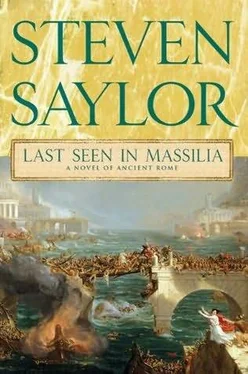Steven Saylor - Last seen in Massilia
Здесь есть возможность читать онлайн «Steven Saylor - Last seen in Massilia» весь текст электронной книги совершенно бесплатно (целиком полную версию без сокращений). В некоторых случаях можно слушать аудио, скачать через торрент в формате fb2 и присутствует краткое содержание. Жанр: Исторический детектив, на английском языке. Описание произведения, (предисловие) а так же отзывы посетителей доступны на портале библиотеки ЛибКат.
- Название:Last seen in Massilia
- Автор:
- Жанр:
- Год:неизвестен
- ISBN:нет данных
- Рейтинг книги:3 / 5. Голосов: 1
-
Избранное:Добавить в избранное
- Отзывы:
-
Ваша оценка:
- 60
- 1
- 2
- 3
- 4
- 5
Last seen in Massilia: краткое содержание, описание и аннотация
Предлагаем к чтению аннотацию, описание, краткое содержание или предисловие (зависит от того, что написал сам автор книги «Last seen in Massilia»). Если вы не нашли необходимую информацию о книге — напишите в комментариях, мы постараемся отыскать её.
Last seen in Massilia — читать онлайн бесплатно полную книгу (весь текст) целиком
Ниже представлен текст книги, разбитый по страницам. Система сохранения места последней прочитанной страницы, позволяет с удобством читать онлайн бесплатно книгу «Last seen in Massilia», без необходимости каждый раз заново искать на чём Вы остановились. Поставьте закладку, и сможете в любой момент перейти на страницу, на которой закончили чтение.
Интервал:
Закладка:
We woke at dawn in a house where confusion reigned. No one seemed to be in charge. Slaves seemed to come and go as they pleased, with no one to give them orders. But when I tried to enter the wing where Apollonides had questioned me the previous night, two very unhappy guards blocked my way. When I tried to speak, they brandished their swords and shouted me down.
I tried to find Hieronymus again, without success. In the foyer, I saw that the front door of Apollonides's house stood wide open. I stepped onto the porch and saw that the courtyard gates were open as well, with no soldiers standing guard.
The walls of Massilia were hopelessly breached, yet throughout the long night the Romans had held back. Dawn had come, and still Trebonius did not mount an assault.
But overnight, the rumor of Caesar's imminent arrival had spread throughout Massilia. He was expected the next day… the next hour… the next minute. Fits of panic convulsed the city. Tearful worshippers thronged the temples. I had experienced something similar in Brundisium, but there the people had awaited Caesar as their deliverer. The Massilians awaited him as their destroyer. They knew too well the atrocities he had visited upon their neighbors, the Gauls-villages burned, men executed, women raped, children enslaved.
Chaos ruled the streets. What madness had possessed the sober people of Massilia, famed for their staid academies, their love of order, their bland equanimity? Massilians were said to love money above all else and to exemplify the concomitant virtues-diligence, shrewdness, patience. Yet in the streets that day I saw staggering drunkards, bloody fistfights, a naked corpse hanging from a tree, a man in rich banker's robes chased down and stoned by an angry mob. In the final moments of a great city, some citizens had descended to barbarism and could think only of their last chance at retribution against a neighbor. Massilia was tearing itself apart before Caesar had the chance.
I saw a troop of gladiators marching toward us and gestured to Davus to hide, fearing trouble. But the man commanding the gladiators had already seen us. He ordered his men to halt and strode over to us. It was Domitius, dressed in full battle regalia, his cape thrown back to show the copper disk embossed with a lion's head on his breastplate. Behind the cordon of gladiators, slaves wheeled carts piled high with trunks. Evidently, Domitius was leaving Massilia as he had arrived, with his ragtag band of gladiators, his household slaves, and whatever was left of his six million sesterces. At the siege of Corfinium, rather than fall into Caesar's clutches, he had attempted suicide-and failed. Caesar had forgiven and released him. Now, once again facing the same prospect, Domitius apparently had no stomach for a second suicide attempt and did not trust that Caesar would be as merciful a second time.
I couldn't resist a sardonic jab. "Leaving us so soon, Domitius?" He glared at me. "I understand that bastard son of yours is alive after all. So Milo was right."
"Yes. But Meto's not a bastard. He was a slave whom I adopted."
"Aren't all slaves bastards by definition?"
"One might say the same about Roman politicians."
His eyes flashed. I glanced nervously at the band of surly gladiators and swallowed dryly, wondering if I had pushed him too far. But in the next instant Domitius barked out a laugh. "Like father, like son, even if yours is adopted. What audacity you Gordianii have! I might almost wish you were on our side."
"What makes you think I'm on Caesar's side?"
"Aren't you?"
I didn't answer. I looked at the carts piled high with trunks. "I suppose you've kept a ship in the harbor?"
"Three ships, actually. Apollonides wanted to conscript them for battle, but I told him I'd have none of that." He wet a finger and held it to the breeze. "The wind's shifted from yesterday; we shall have good sailing. The ship I'll be taking is a long, low beauty, swift as a dolphin."
"She'll have to be, to get past the blockade." I glanced toward the north, where the sky was turning dark. "It look as if Aeolus might be bringing us storm clouds."
"Blockade or no blockade, storm or no storm, nothing shall stop me from getting out of this Hades-on-earth!"
"Caesar will be disappointed. I'm sure he looks forward to your reunion."
"As do I! But not here, not now. Another day, on another battlefield!"
"What about Milo? I don't see him in your retinue."
"Milo is staying right here, where he belongs. If he's lucky, when all this madness is over, Pompey will grant him a generous pardon and invite him back to Rome, where he can grow old and fat fishing on the banks of the Tiber. Until then, Milo must make do with Massilian mullets. No more talk, Gordianus! You've delayed me long enough."
And with that he was off again, barking an order at his gladiators to quicken their pace.
Dark clouds obscured the sun. Sharp winds blew through the narrow streets of Massilia, carrying the scent of rain. Despite the looming storm, Davus suggested we go to a high place, where we might be able to see the breached section of the wall and scrutinize the activities of Trebonius's army outside.
As we trudged uphill, looking for a good vantage point, we encountered a large crowd gathered outside a temple. Some of the people chanted solemnly with their eyes shut. Some shrieked and spun about madly while others looked on, appalled. I located a spectator who looked reasonably calm and sober and asked him what was happening.
"The scapegoat," he said. "The priests of Artemis are making ready to conduct him to the Sacrifice Rock."
I pushed into the crowd. Davus helped clear the way. At last we came to the steps of the temple, where a black funeral bier lay upon a familiar green-canopied litter. A group of priests were just stepping out of the temple. Their white robes whipped in the wind. Wavering streamers and vortices of smoke rose from their bowls of smoldering incense. Flanked by the priests, a tall figure in green emerged from the temple. His face was hidden behind a green veil, so that from head to toe he was covered in green, like a chrysalis. I tried to step toward him, but a cordon of soldiers barred the way.
I called out his name. Hieronymus turned his head in my direction. He whispered to one of the priests, who frowned but nevertheless approached the soldiers and told them to let me through. I rushed up the steps.
"Hieronymus!" I tried to keep my voice low. "What is this? What's happening?"
"Isn't it obvious?"
"Hieronymus, I can't see your face. That veil-"
"The scapegoat wears a veil on his final day. The gods are watching. The sight of the scapegoat's accursed face could only offend them."
I lowered my voice to a hoarse whisper. "Hieronymus, you mustn't go through with this! If you can postpone the ceremony for only a little while-Caesar is on his way. It may be only hours-minutes-"
"Postpone the ceremony? But why?"
"There's no need for it. The siege is all but over. Your death will change nothing. You can't possibly save the city."
"Not from conquest; but perhaps the city may yet be saved from utter destruction. Who knows what Caesar intends? The sacrifice of the scapegoat may tip the scales and cause Caesar to be merciful."
"Caesar will as do he pleases, no matter what happens to you!"
"Shhh! Don't tell the priests that, or the people of Massilia! For months they've pampered and pleasured me, preparing me to take on all their sins at once. Now they want to see the ceremony carried through to the end."
"But, Hieronymus-"
"Quiet, Gordianus! I'm at peace. Last night Apollonides called me to his private chambers. He told me everything."
"Everything?"
He nodded. "I know that your son Meto is alive. I'm happy for you, Gordianus! Apollonides also confessed to me that it was his father who ruined my father. I had long suspected as much. And… he told me about Cydimache. My father jumped from the Sacrifice Rock. Apollonides's daughter was pushed. His line has come to an end. The shades of my parents are appeased."
Читать дальшеИнтервал:
Закладка:
Похожие книги на «Last seen in Massilia»
Представляем Вашему вниманию похожие книги на «Last seen in Massilia» списком для выбора. Мы отобрали схожую по названию и смыслу литературу в надежде предоставить читателям больше вариантов отыскать новые, интересные, ещё непрочитанные произведения.
Обсуждение, отзывы о книге «Last seen in Massilia» и просто собственные мнения читателей. Оставьте ваши комментарии, напишите, что Вы думаете о произведении, его смысле или главных героях. Укажите что конкретно понравилось, а что нет, и почему Вы так считаете.










